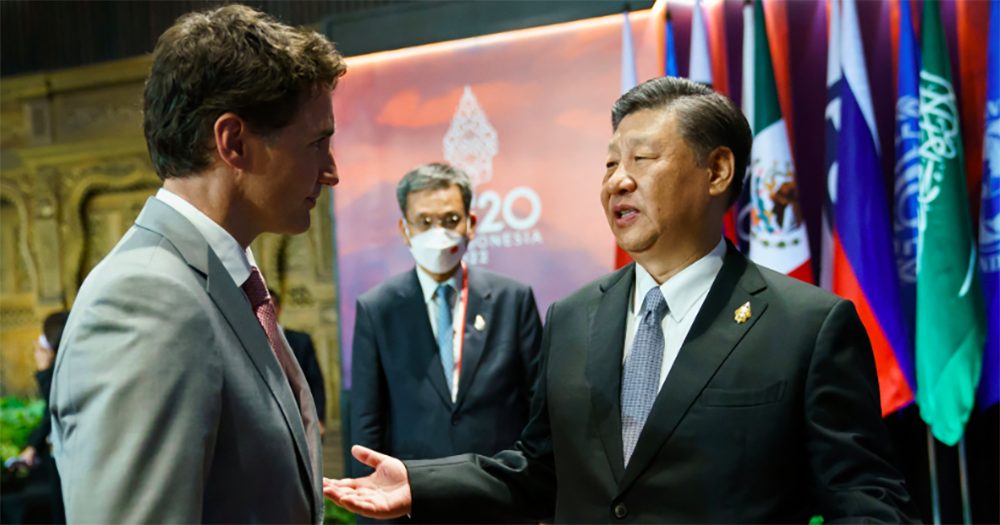Follow us on Telegram for the latest updates: https://t.me/mothershipsg
Chinese President Xi Jinping and Canadian Prime Minister Justin Trudeau were caught on camera in an awkward exchange during an informal meeting on Wednesday (Nov. 16), during the sidelines of the G20 Summit held in Bali, Indonesia.
The last few minutes of the candid moment, which provided a rare glimpse into how Xi interacts with other leaders, was captured by the Canadian press:
The Cdn Pool cam captured a tough talk between Chinese President Xi & PM Trudeau at the G20 today. In it, Xi express his displeasure that everything discussed yesterday “has been leaked to the paper(s), that’s not appropriate… & that’s not the way the conversation was conducted” pic.twitter.com/Hres3vwf4Q
— Annie Bergeron-Oliver (@AnnieClaireBO) November 16, 2022
Xi could be heard saying the following (loosely translated to English):
"(You) told the press what we talked about, that's not appropriate. We (China) don't proceed this way. If there's sincerity, then there's mutual respect for each other and we can communicate well. Otherwise, there would be no telling how this might conclude."
Without waiting for Trudeau to respond, Xi started walking away, but not before Trudeau could get some last words in.
"In Canada, we believe in a free and open and frank dialogue, and we will continue to have... we will continue to look to work constructively together. But there will be things that we will disagree on..."
A handshake and a departure
As Trudeau went on, the smile on Xi's face began to fade. Before Trudeau could finish, Xi held up both his hands to stop him from going further.
Xi then said, "Create the conditions, create the conditions."
He then gave a seemingly polite but dismissive smile and offered a handshake to Trudeau, who took it with a grim expression. The exchange then ended as Xi walked away, for real this time.
When asked on Wednesday the meeting between the two leaders the day before, China's Ministry of Foreign Affairs had declined to comment, with a spokesperson saying they have nothing to share at the moment, The Washington Post reported.
Chinese nationalist state-backed media the Global Times, however, reported that Trudeau had expressed his hope to Xi that they could talk about their bilateral relations, Ukraine, and the Korean Peninsula, among other issues.
Citing an unnamed source, they further said Xi responded by saying that for Canada-China relations, both countries need to find a common ground while managing their differences.
Canadian intelligence reported Chinese interference in election
In his exchange with Trudeau, Xi was likely referring to media reports about what they discussed on Tuesday, Nov. 15. The two leaders had met for the first time in more than three years.
According to Reuters, which cited a Canadian government source, Trudeau raised "serious concerns" over suspected Chinese interference in Canada's 2019 election.
It was previously reported by Canadian news outlet Global News on Nov. 7 that Canadian intelligence officials had warned of foreign interference from China that aimed to further Beijing's influence in the Canadian government.
On Monday, Nov. 14, Canadian police also arrested an employee working at the country's largest electricity producer Hydro-Quebec.
The 35-year-old, Wang Yuesheng, was charged with espionage for allegedly trying to steal trade secrets for the benefit of China. He was earlier fired for "serious breaches of the company's code of ethics".
Bilateral relations between China and Canada suffered a dip in 2018 when Meng Wanzhou, the CFO of Chinese telecoms giant Huawei, and daughter of Huawei founder Ren Zhengfei, was arrested in Canada. Beijing subsequently arrested two Canadians on spying charges.
Despite all three being released later, tensions between the two countries still remain.
There's no free press in China
In China, the government has maintained strict control over the media as a means of controlling the public discourse. All major newspapers, such as the People's Daily and Xinhua, are state-run.
One of the few independent outliers (or as independent as it can get) is perhaps popular financial magazine Caixin, which often goes beyond what other outlets publishes, with its investigative offerings.
It was dropped in 2021 from an official list of outlets that websites can republish.
The Chinese government also regularly employs censorship on social media to stop unsavoury or sensitive information from getting out to the public.
Top image via Canadian Prime Minister's Office
If you like what you read, follow us on Facebook, Instagram, Twitter and Telegram to get the latest updates.
